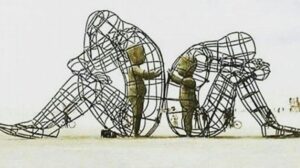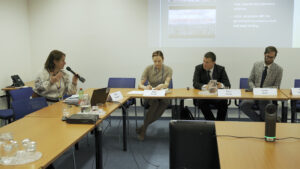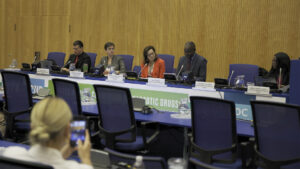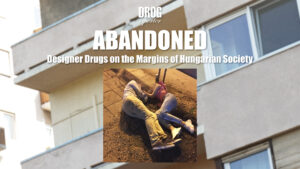On November 28 – 29, 2011, the Czech Centre in Bucharest was the host of a two days conference as part of our EDPI project – read the report of our Romanian partner, Valentin Simionov and a Czech researcher, Vendula Běláčková
The two days conference aimed to draw public attention on drug policy issues by comparing the situation in two countries with a common past, but a very different present, at least in drug policy terms: the Czech Republic and Romania. On the first day, as part of the Czech Centre “Documentary Mondays” series, the documentary movie “Katka” showed the story of a young woman struggling with her heroin and methamphetamine addiction. Helena Trestikova, the director, records Katka’s descent over the years into a spiral of theft, prostitution, physical and psychological deterioration – a spiral that is broken only by brief flashes of hope and resolutions to stop taking drugs, as she is visiting different levels of targeted addiction services in the Czech Republic. The movie inspired an interesting debate, which continued during the next day.

Valentin Simionov, the head of the Romanian Harm Reduction Association
The public showed interest for both countries and asked pertinent questions. A debate was initiated: why are there so big differences regarding drug control? How come marijuana use is not a big deal in the Czech Republic while Romanians tend to see it as a gateway to hard drug use? What can a drug user do when he needs help? What can authorities do to tackle drug problems?
Participants were curious to find out more about what seemed to be a contradiction: although the possession of drugs is not criminalized and life-time prevalence of cannabis in the Czech Republic is the highest in the EU, the prevalence of problem drug use, which imposes the greatest burden on public health systems, is relatively low in this country. Vendula Belackova explained the situation by the flexibility of the Czech policy and the positive effects of decriminalization: drug users are not afraid to enter specialized services. The treatment system does not include abstinence-oriented services only but substitution and other harm reduction services as well.The Czech case has been special in terms of having introduced some specific harm reduction interventions at an early stage of the drug epidemic that peaked in the 1990s, after the fall of socialist regime. Learning from Western harm reduction policies to prevent the newly discovered infections of HIV and HEP C, the Czech Republic achieved the lowest levels of HIV and Hepatitis C among the drug using population in the EU – and considering the situation in the developing world, it is possibly also among the lowest in the world!
After a brief introduction about the history of drug use in Romania (mainly based on an excellent book, “Narcotics in the Romanian Culture”, by Andrei Oisteanu), Valentin Simionov focused on the Romanian drug control policy in his speech. It seems difficult to understand why all actions related to drugs, except the actual use, is criminalized. The Romanian legislation does differentiate between possession of drugs for personal use and possession for selling. Thus law enforcement has the discretion to decide if they arrest a drug user or a drug retailer. In addition, art. 16 of the Act on Drugs (143/2000), allows law enforcement to “negotiate” with the drug offender, to motivate the offender to give information about dealers who supplied him with drugs.
The effectiveness of this provision is questionable. For the most vulnerable, those who cannot afford a lawyer, it leads almost certainly to a prison sentence. In terms of public health, NGOs are in charge with keeping the population safe from HIV and Hepatitis. The introduction of needle exchange programs has helped to control HIV, but it came too late for hepatitis C, which has a 90 percent prevalence among injecting drug users. There are few campaigns to educate the public about drugs and this leads to negative attitudes to drug users. This results in the stigmatization of drug users, people tend to take merit out of their ignorance about drugs. If they were informed about drugs, it could generate personal sympathy to people who use drugs.
For the first time in a public conference, drug users came out and discussed openly about their use, and the problems they face as such. The quality of treatment is poor in Romania and there is no access to many treatment options, compared to Western countries. There is a stigma attached to be a drug user in Romania and the stigma lasts for a long time even after quitting drugs. New psychoactive substances – known as legal highs – pose an even bigger threat than “classical” illicit drugs.
A long debate at the closing session of the conference confirmed what the organizers supposed: conferences like the one at the Czech Centre of Bucharest are very useful to share experiences and we need more events like this in the future.
About the autors:
Vendula Běláčková is a junior researcher at the Centre for Addictology, Psychiatric Clinic of the 1st Faculty of Medicine, Charles University in Prague. With her background in economics, media studies and addictology, she has worked on research: Marijuana markets in the Czech republic – different drug policies and harms, Social costs of alcohol, tobacco and illicit drugs in the Czech republic in 2007. She is lecturing at the 1st Faculty of Medicine in Prague and at the University of Economics in Prague on the issue of economic perspectives of drugs and drug policy.
Valentin Simionov is the head of the Romanian Harm Reduction Network. He has been working for needle exchange programs and various advocacy organizations for seven years. He led research and training project aiming at raising awareness on drug problems and its individual and social consequences. Currently, he is documenting the costs of the Romanian anti-drug policy and participates in the global drug policy reform movement. He is the Romanian partner in the European Drug Policy Initiative.





